More than a Lesson Plan
Covid-19’s effects on the 20-21 school year have illustrated how being a teacher goes beyond reading Shakespeare and learning algebra.
I love school. Ever since second grade, I have always felt like I belonged with a pencil in my hand. Maybe I’m an outlier, but the rush of raising my hand and getting the question right will never cease to bring a smile to my face.
Teachers love learning more than I could ever imagine. They gave up a life of doing what they love to teach what they love. They spend their lives training the world’s future how to live, and their lessons go beyond the knowledge found in a textbook. A teacher from Fairview High School has a routine to get that future to connect with the world that will soon be theirs.
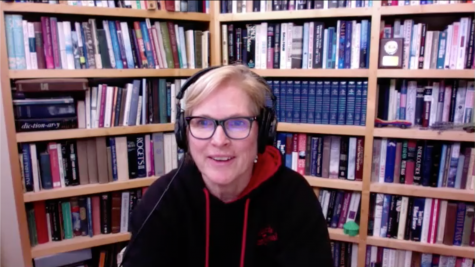
“One of my favorite things to do in the classroom is to do mindfulness at the beginning of every class. So we sit and we always do three deep breaths. Sometimes on Fridays, we’ll go for a short five-minute walk outside,” said Tracy Brennan. “I just say to notice what you see, touch, taste, hear and smell. They try to get at least three of their senses and notice what’s going on around them in the world in that present moment.”
Going beyond being just an English teacher, Brennan takes every opportunity to teach her students life skills. The skill shown in her beginning-of-class routine allows for a quick moment of reflection before diving headfirst into a lesson.
“When I lecture, I ask a lot of questions. I try to get a lot of feedback from my students. You can see body language and other things with students. You can see if they’re dialed in and paying attention, or if they’re kind of drifting off and their own worlds a little bit,” said Terrence Dunn, a teacher from Broomfield High School. “Even though it’s a more traditional style, I think there’s a lot of interaction with those kids.”
Nearly every teacher has a different approach to their class periods. The many disciplines taught in a school all have different needs. Some lead the class through a PowerPoint while others have students read aloud, yet they all somehow have the same goal in mind.
“My goal that I always tell my students is I’m creating my neighbors,” said Nicole Guagliardo, a teacher from Overland High School. “My goal is that someday when you’re 21, I can come over to your house, and we can have a beer on your porch. My bucket gets full being around other people and especially young people.”
Guagliardo is a firm believer that her students will quickly forget the books she teaches them about, but will never forget the things they learned about relationships from her class. She, like many teachers, forms bonds with their students they cherish very deeply.
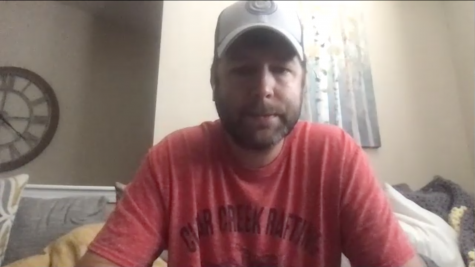
“I feel like I’ve always taught for the right reasons. Some of my proudest moments are when the students come back to see me, want to go to lunch with me or text me in the middle of the night because they’re struggling in college,” said Mike Willahan, a teacher from Mountain Vista High School. “I got into coaching as well, so I have former players come back and join my staff. No paycheck or anything else could amount to what that means to me.”
During the start of last school year’s second semester, a once-in-a-lifetime pandemic started. An extended spring break quickly expanded into major life-altering repercussions. Covid-19 in America shifted from a conversation about foreign countries shutting down to one about how to handle it on American soil.
“During the summer, I was a little stressed because the district didn’t make a decision for what my school day was going to look like until it felt like the week before we started, which was just a little stressful for me planning wise,” said Sarah Humphries, a teacher from Grandview High School. “The days could be three hours, they could be 15 minutes, they could be in person or they could be online. So, that was a definite challenge that was going through my mind. Then, obviously, as we moved towards in person I was worried. Is it going to be safe? How are students going to be doing with wearing masks? What are the protocols going to be for moving students through the building?”
This year, teachers have had the nearly impossible task of embracing a brand new school system before it had even been fully formed. Teachers were forced into isolation with one of the most challenging jobs in the world. Right now, their careers are on a swiftly sinking ship -and they weren’t given swimming lessons.
“We don’t get an education to teach online. People take my class to be active. You know what we can do in a team sports class online? There’s really not much,” said Willahan. “We can talk about being a good teammate and that kind of stuff. But the kids have taken my class to be active and it’s hard for that.”
The class projects missed and traditions that had to be left behind for safety reasons will cause a lack of memories for many. There are also simple things that are not a reality this year, and many miss those more than they could have ever realized they would have.
“I just miss the noise. I’m a Spanish teacher and my favorite part about in-person learning is literally just being around the kids. I kind of thrive on organized chaos,” said Rikki Keiser, a teacher from Fairview High School. “I like the really big classes. I like the loud, interactive classes. A lot of the time I’ll have Spanish music playing in the background while the kids are working in groups.”
Missing the noise of her classroom, Keiser has held on by sticking with her community. She and her coworkers have grown closer than before by necessity. The teachers at Fairview have not only looked out for each other but also their students.
“I have a pretty close group of girlfriends at the school who run a group chat. We will vent and moan and cuss with the best of them, but then we get back to it. We help lift each other up and through the tough times,” said Keiser. “A lot of teachers dropped off food to students who needed it. They would literally go to their house, drop off food on their porch and check in with them. I think overall people are handling this the best way that we can.”
This unity of communities is found in groups of people all over the state. Teaching social studies at D’Evelyn High School, Rush Daly has found himself surrounded by support through this experience. He has given his all and has received just as much from his school.
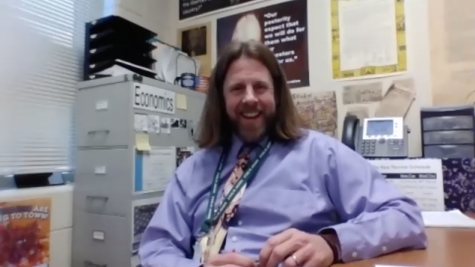
“The family engagement here is almost scary because it’s so impressive. When our administration said, ‘hey, here’s the deal. Make your choice; fully remote or fully live or this hybrid version.’ If you’re in the building, you’re wearing a mask and we’re socially distancing. There wasn’t a push back,” said Daly. “If this is what we have to do to try to keep schools open, this is what we’re going to do. Everybody jumped in all hands on deck and approached it in a supportive manner to meet the needs of CDC and Jefferson County Public Health requirements. That was really impressive.”
Fairview and D’Evelyn have come together in unique ways through the pandemic. Others, unfortunately, have never felt so alone. “The hard part is the isolation. I sit down in my room and I don’t see another teacher,” said Steve Brown, a teacher from Grand Junction High School. “At lunch, I go outside at a picnic table. I’m back to my room and I just don’t see anybody. It’s been a little difficult.”
Contrary to many misled students, teachers have feelings too. When they walk through their hallways, if even allowed in the building, they are separated by masks. No longer can they get coffee together during an off period or talk with a friend during a meeting that could have been an email.
“The ancillary people in my life have totally fallen away. The people that I would chat with at the photocopy room or swing by their office just to check in to see how they’re doing are gone,” said Ethan Dusto, a teacher from Cherry Creek High School. “Everybody wants to chit chat. Everybody really wants to kind of make those little small talk relationships that help to make you feel like you’re part of a community.”
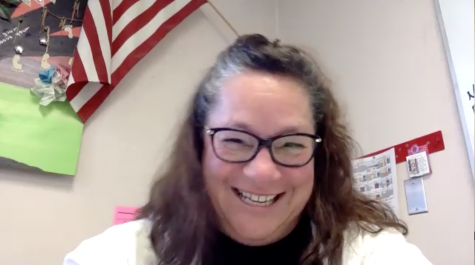
The relationship loss Dusto is feeling has affected many teachers. Just like their students, have colleagues and friends they do not get to see anymore. “There’s certainly a lot of disconnect. We don’t see people the way we used to see people. I’m not alone in saying that I spend more time in my classroom than out of it,” said Wendi Kuntz, a teacher from Chaparral High School. “We don’t do our birthday celebrations that we used to do every month in our department and some of those kinds of things. We’ve modified them a little bit but it’s just not the same.”
Not only are teachers separated by masks, but they are separated by the most work they have ever had in their careers. I have learned that online learning is very different from in-person learning, and teachers have learned that the ways they teach in a classroom do not always work for an online platform.
“I honestly have never worked harder or more than I have in 22 years of teaching than I have this year. I teach biology and forensic science,” said Danielle Garrity, a teacher from Chaparral High School. “In biology we have some labs, but labs are all that forensic science is. Now, I’m adapting them to be done at home, and I’m adapting them for our learners.”
Teachers know all about heavy workloads. Endless grading and preparation have brought them long days and nights in past years, but they were not ready for what was to come as a result of Covid-19. “I didn’t expect it to be the amount of work that it is. It’s like reinventing the wheel. And for a lot of us it’s like being first year teachers again,” said Adam Chilton, a teacher from Fairview High School. “You spend a huge proportion of your career developing the content that you’re going to use again and again and make it better. A lot of that went out the window.”
Adapting materials to fit an online platform is barely half of the problem. Chilton has also learned how much his teaching style depends on being able to talk to students one-on-one and face-to-face.
“The big thing as a math teacher is that [right now] I don’t have a good way to see their work and I don’t have a good way to give them meaningful feedback in a timely manner,” said Chilton. “I don’t feel like our classes are nearly as effective because we can’t, you know, do the math-teacher-look-over-the-shoulder kind of thing. I don’t feel like, as a teacher, I’m having the same impact that I typically would.”
The missing link for many teachers this year is relationships. “I feel like I can’t teach them without knowing who they are and where they’re coming from,” said Daly. “My greatest frustration this school year is that I just don’t have the fun camaraderie and rapport that I normally get.”
Teachers go to school for years upon years to learn how to teach, yet the most learning they do is from actually teaching. The pandemic has, arguably, been the biggest learning curve of all. Teaching theatre at Mountain Vista High, Jeremy Goldson has completely revamped his grading style. He now bases them entirely on reflexion and experiences. He hopes that other teachers follow suit.
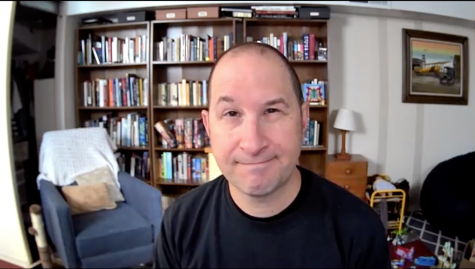
“Why are we trying to hold kids accountable? There’s a pandemic. Why are we not attending to their social and emotional health? Why are we not attending to their life skills?” said Goldson. “So I came back this year and I started to really change the way that I graded things and I started to diminish the importance of obedience. I really lean into asking them what they’re learning.” He has adapted the way he views grades with the times. Many aspects of teaching have had to change this year and will affect the future of teaching as well.
“The biggest takeaway is truly I’m going to be a better teacher going forward. We’re all going to be better. It’s extremely frustrating. It’s really hard. I’ve spent hours and hours and hours remaking things that I’ve done very successfully in person. To make sure that I do it well and that students get what they need to get out of it has been challenging,” said Rusty McCleave, a teacher from Eaglecrest High School. “I don’t know if you love the social reform movements or not, but you’re going to write an essay on it. And you might as well be prepared for the essay. So, the optimist in me believes that I will definitely have a vast amount of new tools to make class even more engaging.”
Throughout my education, I have seen the technology used to teach me also grow up with me. Total whiteboard teaching has slowly evolved into every teacher at my school carrying touchscreen laptops that can project anything they could dream of from the interwebs.
“[The pandemic] forced a lot of teachers, especially older teachers, into coping with technology. Many of them have just been like, ‘no, I’m not gonna learn how to use anything new,’” said Chilton. “We still had people going into this at my school that were teaching math on overhead projectors. It’s modernized as many people as much as you could have modernized them.”
Regular zoom calls and totally digital coursework have revolutionized education- without the internet teaching during this school year, decent education would have been next to impossible. Screens saved the education system this year, but it raises concern on whether or not they will cause more harm than good in future years when they are no longer a necessity.
“I’m really concerned about mental health and physical health because of how overwhelming it is to sit in front of a screen all day long. Human beings aren’t meant for that. It looks so different now,” said Kuntz. “I just said, ‘take back your education. You didn’t learn to walk because you watch somebody on the screen tell you how to do it.’ I have tried to approach things more interactive with the text and with each other and getting them off their computer whenever I can.”
Kuntz has deep fears of screens taking over student’s health. “Teachers are used to interacting with and helping their students in person, looking into their eyes rather than blank screens to understand what their students are grappling with. It is difficult to help solve their problems through a screen. Without seeing students in building, communication issues have arisen between educators and their pupils.
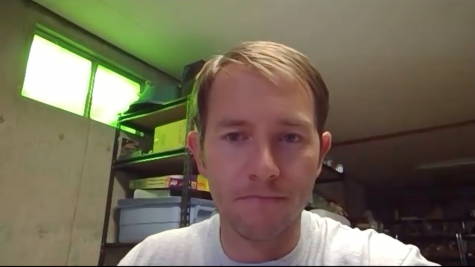
“I feel like I’m being very straightforward and transparent with deadlines and expectations. Routinely I’ve got kids who are telling me, ‘I don’t know what’s going on. I can’t seem to know what’s due on what day and what you want from me versus what my other teachers want,’” said Dusto. “That one’s hard. It’s hard for me to understand that, when I’m sending multiple emails a day and giving a lot of direction, I feel like.”
McCleave, meanwhile, knows his students want to do the best they can, but also knows that they are running into more than one issue along the way. “Energy level has been really low from the students. They’re being asked to be organized. In an instant you have to manage your time wisely without practice. I’ve been doing this for years: having to get myself out of bed and get to work on time and take care of myself and my family,” said McCleave. “Students have been told where to be and when to be there for so many years. I know people are probably staying up way too late doing schoolwork because they’re not doing it during the day time that’s available. I think they’re probably staying up way too late and then they come in with zero energy. It becomes this snowball effect.”
Noticing the snowball effect, like McCleave describes, and just how much it is taking a toll on their students mental health, teachers refuse to stop searching for answers. This continual search for answers continues, even when the most devastating occurs.
“Part of the art of teaching is to understand kids who aren’t vocalizing all the time, but you can get to know them by the way they interact with each other in class,” said Brennan. “Unfortunately, this week one of my students committed suicide. I feel as if I had him in class, I would have been able to, maybe, been able to feel or understand or sense that he was in a dark place.”
The guilt Brennan feels due to the heartbreaking loss of her student is an emotion most will never be able to relate to. Teachers are more commonly seeing that their students are struggling, with no real solution in sight for this year if it continues online.
“[My students] are despondent, especially my upper classmen. The wear and tear is beginning to show up. They had expectations about what their senior year was gonna look like. They were so excited that that senior ahead of them graduated so they could get in a play or they’re trying to figure out the college application process,” said Goldson. “Everybody they’re talking to is on the end of the zoom call. They show their best side to me, but I probe a little bit. They say, “yeah, you know, I laid in my bed and cried for a half hour last night.’ That’s got to be exhausting.”
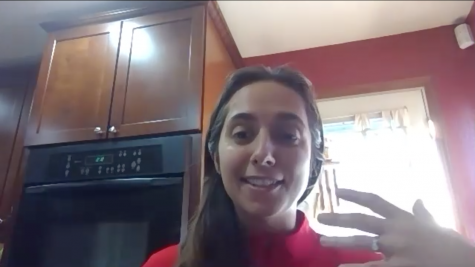
The shift from in-person to online, which for some happened multiple times, is hard on even the most adaptable people. “We’re all adjusting. It’s neither good nor bad. It’s just change, and change is hard on everybody,” said Tiffany Yonts, a teacher at Eaglecrest High School. “I’m here for my students and I love being with my kids to create relationships. I think the community has had a bit of a shift in realizing that teaching is not an easy job. Just because you went to school doesn’t know you know how to teach.”
The compassion the public has begun to show teachers has finally arrived. They do not deserve to be called babysitters or told that they are undeserving of praise. The pandemic has truly brought to light the fact that teachers do so much more than just make lesson plans.

Jeremy Garza is a senior, and not a Challenge Middle School graduate, a fact which he laments. However, his remarkable memory, obsession with the Times...


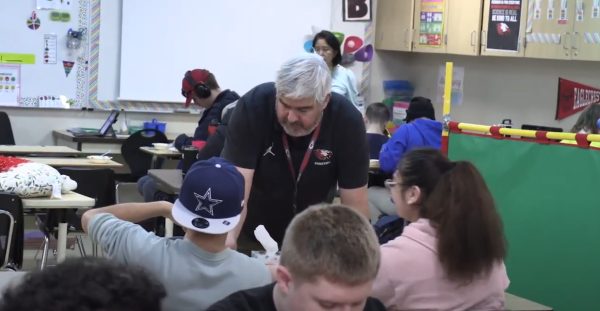




Natasha K • Dec 16, 2020 at 8:36 AM
Thank you for this well-written article. I’m a teacher in DCSD, and I’m so grateful to hear from teachers all over the Denver metro area. Thank you for the time you took to listen to so many voices, and thank you for the respect you show toward the teaching profession. I hope you have a wonderful holiday season and a much deserved break.
Wendi Kuntz • Dec 16, 2020 at 7:53 AM
Wow, Jeremy. Thank you for pulling together so many teacher perspectives on teaching during the pandemic. I appreciate that you dialogued with teachers from across the state. Well-written, which warms my English teacher heart! 🙂
Tracy Brennan • Dec 14, 2020 at 10:44 AM
Jeremy,
Great article! You did such a thorough job talking to a lot of different teachers in different subject areas, and you organized your article in a very pleasing, easy-to-read progression. Kudos to you!
Tracy Brennan